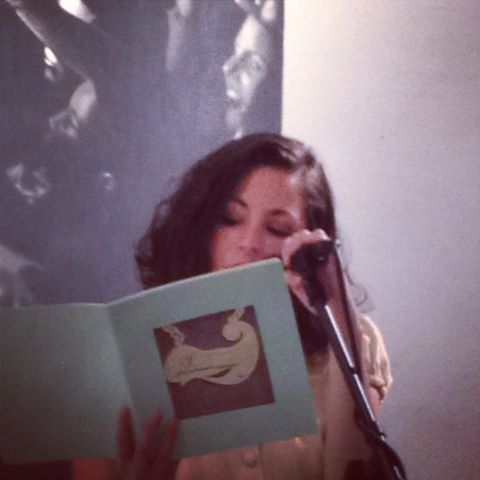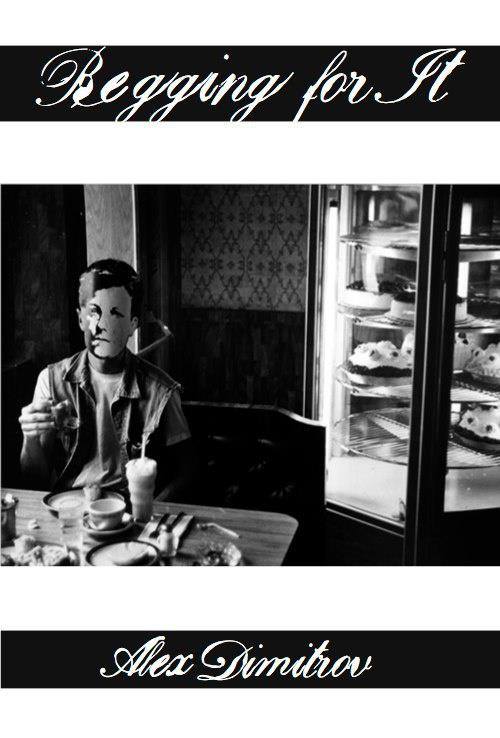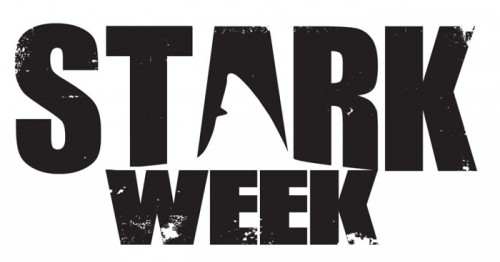Monica McClure’s Mood Swing Book Party
Last nighttime I was in Lena Dunham Land, which I don’t like in the least, as 99 percent of the people who reside there claim to make poems, and these people who claim to make poems are nice, sociable, and happy. They would never use chemical weapons, nor would they ever vote to shut down the United States government, and all of that, to me, is utterly unacceptable.
But what’s very acceptable is Monica McClure. The poetess beauty (who, one day, will make a marvelous malicious housewife in Connecticut) hosted a party for her chapbook Mood Swing. In black tights and a Mandate of Heaven play suit, Monica read mean poems, harmful poems, and, since she’s a girl, poems about Diet Coke and makeup.
The edibles served at the reading included Skittles, which are yummy.
The reading was held at Berl’s Poetry Shop.
This, too, I approve of, as it permits one to purchase collections of poetry right away, such as Carina Finn’s Lemonworld, Chelsey Minnis’s Bad Bad, and certain ones authored by T.S. Eliot
“Narrative Gold” — (In the Memoir Swamp) — Talking to Seattle’s Elissa Washuta
*****
*****
Rauan: why is most Memoir so bad, so boring (and in so many instances just a kind of “grief porn”)??
Elissa: Memoir is the genre most often entered by celebrities. It’s also full of books by people whose lives have been stricken by remarkable tragedies or circumstances that are marketable to readers hungry to know about other people’s lives. If we want to know about that secret wig that Andre Agassi wore for years during his tennis career, he’ll gladly sell us a copy of his memoir, Open. If we want to know how Dustin Diamond felt about playing Screech, he’ll give us an earful in Behind the Bell. Politicians use memoir to push their agendas; the infamous use it to set the record straight. Many celebrity memoirs are ghostwritten, and I get the feeling that the people on the covers don’t think much about craft.
Memoir isn’t working, I think, when the author has no ear for language, no eye for image, a limp voice, and an insistence upon a narrative arc that delivers an easy revelatory triumph at the end. In mediocre-at-best memoirs, the narrators balk when faced with the opportunity to tease out the most complicated tangles of their experience–sometimes, the revelation of their own complicity in what’s gnawing at them. That’s narrative gold in memoir: reading about a character with agency is much more compelling than reading about a helpless victim. I certainly do not wish to judge or take away from the lived experiences of the people who wrote the memoirs that I’ve found the most to critique in (including Prozac Nation by Elizabeth Wurtzel and Lucky by Alice Sebold), but in memoir, there’s a problematic tendency to close the gap between art and life that allows the most exciting work to take place.
I read and listen to (audiobooks of) lots of memoirs. I’ll listen to any memoir that Seattle Public Library has available. While I do think the memoir genre is full of duds, I’ve read so many thrilling, vibrant, well-written memoirs in the past few years, including Rat Girl by Kristen Hersh, The Guardians by Sarah Manguso, Confessions of a Latter-Day Virgin by Nicole Hardy, READ MORE >
Alex Dimitrov: “It’s My Book”
***
The writer Ted Rees takes real issue with Alex Dimitrov’s decision to use a photograph from David Wojnarowicz’s Rimbaud in New York series as the cover of his book. Rees is clearly disturbed by this and over on his Tumblr (HARM MASSAGE) he fleshes out what he considers to be “a multitude of problems” in the form of a letter (DEAR ALEX DIMITROV) that you can read in full here .
***
Here, now though, is an extract from Rees’ letter:
…your use of Wojnarowicz’s photograph is, to quote a friend, “one of the most unconscionable appropriations” of another’s artwork that I’ve seen in years. It speaks to a self-importance wrapped in ignorance at best, and a type of colonialism at its worst. Through social and perhaps physical capital, you have acquired an image, totally denuded it of its creator’s political and social intentions, and made it into what you imagine is a reflection, and thereby a representation, of yourself and your work. The act debases Wojnarowicz, whose life was punctuated by poverty, hardship, confusion, and resistance, and whose work attempted to bring attention to how these elements worked on his own life as well as the lives of those around him.
***
***
And, to follow, now, is the transcript of a little Q & A that I did with Alex:
***
Rauan: You don’t seem too bothered by Rees’ criticisms. But could you tell us why you chose the Rimbaud Wojnarowicz piece for your cover?
Alex: Wojnarowicz’s work is important to me—the anger and passion READ MORE >
Will Hill
Scott McClanahan’s Hill William book trailer is here, lit world.
YOUR MOVE, JOYCE CAROL OATES.
NOW CLOSED: Exclusive Preview of a Short Film – Baseball
Adam Humphreys and Zachary German have produced a short film called Baseball, which was available to stream right here on HTMLGiant for 3 hours Aug. 7, 2013.
Zachary German, who co-wrote the film, stars as a cheating lover who must recall the opening of The Great Gatsby from memory to placate his suspicious girlfriend.
The link below is now dead, contact Adam Humphreys (adamphump@gmail.com) for more information.
Baseball is America’s pastime. Everybody loves baseball. This film has nothing to do with Baseball. They’re playing with you.
Two apartments and one hotel room. A young couple in different time zones. A young guy (Brad) drinking a bottle of Fiji water. A phone call comes through. It is from his girlfriend. A brief exchange establishes they live together. He’s lying to her. She asks him if she left a book on the side table, “The Great Gatsby,” which results in a genuine and convincing look of concern on the part of Brad. It goes from there.
Everything you see and hear in this film is important. The background is important. A cat is important. Brad’s pompousness, in their interaction with another couple, when he quotes from The Great Gatsby in flashback, is important. In very few scenes, the film manages to flesh out the characters pretty well. These are real, believable people in a somewhat wrenching but not unfunny scenario.
I feel a similar cosmic humor in Humphreys’ other two films. And a similar uncanny and profound feeling of disconnection as in German’s earlier literary efforts. Little details, like the cat, the cat’s water, and the couple’s conversations lead inexorably to a muted emotional breakdown. The opening passage of The Great Gatsby, quoted by Brad three times in the film, proves meaningful on multiple levels.
The first time through, it’s funny. The second time it’s not so much. Pain is a big part of comedy. Baseball is a tight little film that will reward multiple viewings.
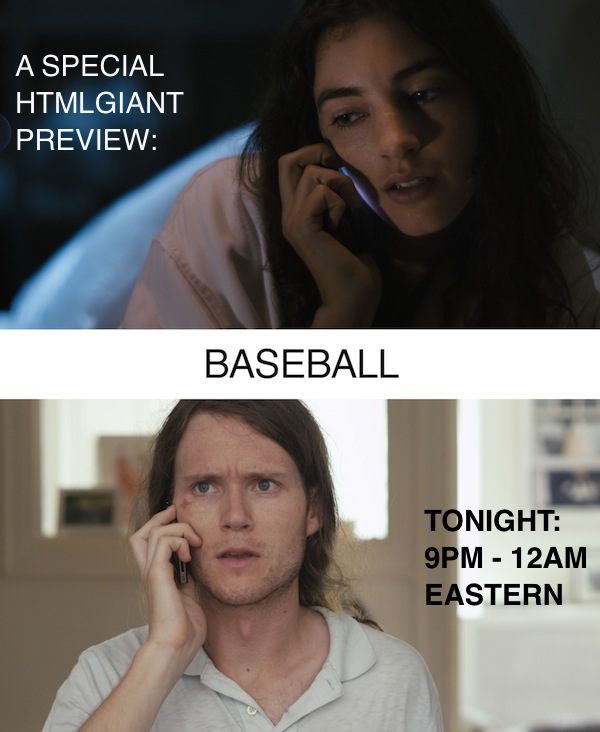
SICHA, CLINTON, CYRUS: THOUGHTS ON DIVERSE DEMOGRAPHIC REPRESENTATION IN MEDIA
Choire Sicha’s first book is out. I haven’t read it yet, but it is called Very Recent History: An Entirely Factual Account of a Year (c. AD 2009) in a Large City. The book party was at the East Village gay bar “The Cock,” and I have to say I have never seen it as packed as last night, at least as a pedestrian who quickly walked past it from the outside. There will be a lot of talk about the book, because almost everyone who reads (a lot?) online knows of Sicha. The book follows a group of gay men and chronicles their lives, but for some reason I trust it to not be regressive, even before I read it. I choose to believe Salon, that it will be “among a next wave of books about gay folks as full American citizens that doesn’t bother walking them through schematic journeys meant to stand in for the American Gay Experience.”
The active endeavor to ensure the meaningful participation of diverse individuals in media is integral. It helps reach a realistic and more informed view on the specifics of a broader range of identities. However, the constant overanalyzing of public figures’ gender, race and ethnicity identification choices may end up harming the very purpose they were intended to serve: letting individuals receive merit-based recognition for their objectively high-quality work.
A recent example of excessive analyzing of such nature is that of Hillary Clinton setting up a twitter account. Since the first moment she signed up for the social media website many jokes–some witty, others offensive–have been recurring. An approach that stuck out to me as particularly idiotic was the interpretation of how she chose to order the numerous qualities that define her in her two-line bio. To assert that Hillary Clinton is “anti-feminist” because she starts her twitter bio with “wife” and “mom” before addressing her professional accomplishments, is not only naive and judgmental, it is also self-righteous and flat-out manipulative. Policing the way people choose to present themselves, and telling them they are not to be taken seriously as feminists because they prioritize differently then the average feminist is expected to (?) is childish.
Additionally, who does not know that she also has served as Secretary of State? Pure common sense makes the dialogue surrounding the topic redundant. I think this line of thinking contradicts the true sense of feminism, as in such a system of order the women are provided the agency to identify how to present themselves. What about the people who use humor in their bios? Is that unethical? Are we taking things–such as a public figure’s social media presence–that seriously, and if we are, whose fault is it?
MANIPULATIVE NATURE OF THE DISCOURSE
A piece in The Millions presented a family saga focusing on the case-hardened nature of the way identity is performed by the writer and her grandmother, who seem to fall into the trap of being defined by the social expectations their social identities in how they attain and use power.
“As mixed-race girls, we learned to take what we could from where we could to make a whole. That’s a vulnerable position to be in, susceptible to second-guessing and collapse, but it’s also a crash course in manipulation. Hence the posturing of invulnerability. The multitude of ways that my grandmother and I announced a lack of need, and presented ourselves as in solid control. We don’t need you, we projected, and therefore we may have to ignore what you need as we go about proving that to ourselves once and again. One of the only things I know how to say in Chinese is: Wo zi ze lai. I can help myself.”
After its initial appearance, the ideology of representation has slowly lost a large chunk of its significance. There are times that I feel like I am not supposed to not like non-white writing, even if some of it has to be mundane, dull and entitled. The worst is when the writing is also patronizing and borders delusional. In some ways, if the argument is reduced to powerlessness as its selling point, it cannot easily be powerful when the powerlessness is not real.
I am not Miley Cyrus’ biggest fan, but an open letter addressed to her on The Huffington Post offended me. The writer aggressively requests Miley Curys ought to stop disrespecting “what feels black.” What he means of course, is that she should stop trying to emulate the rap element that currently dominates pop culture: she is white, thus cannot and must not do these things associated with what the author considers parts of the black identity, such as twerking. To claim these as an exclusive element of black culture is silly, and certainly flawed at its core: it leads to a new separation and division among people of different races. It seems like the writer might not be comfortable with a broadly inclusive culture that is not segmented the way he views it, or at least that is what the tone of his letter indicates.
His main issue and the central issue with her is her requesting producers that she was trying to go for a vibe that “feels black.” Her creative endeavor to do that cannot be offensive. It can be successful or not. While it is difficult to decide which is the case, at the end of the video for “We Can’t Stop” she smiles wearing a grill. It is not a mocking grin, rather a smile of awareness. She knows what she is doing, and she is doing it with a sense of humor.

August 7th, 2013 / 1:21 pm
STARK WEEK EPISODE #11: “No myth is written all at once” — Jared White on THE LAST FOUR BOOKS OF SAMPSON STARKWEATHER
For our final textual episode of Stark Week, Jared White takes us a billion years into the future, where creaky American poetballer Sampsonian Starkweathershire has released his final four books, capping over a career of the highest highs and the lowest lows and the crunchiest chicken tenders. Later today we’ll be posting TWO CONTESTS where you’ll have a chance to win your own copy of The First Four Books of Sampson Starkweather. HTMLGIANT fav Unnameable Books in NYC reports that people have been stealing The First Four Books, which you shouldn’t do, but is also kind of cool, right? DON’T STEAL; WIN CONTESTS. STAY TUNED! For now, we turn to Mr. White and the year 2066—or was it 2666?
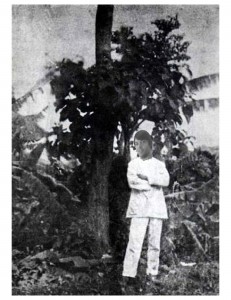 Sampson Starkweather died for the fifth time in the year 2066— or was it 2666? Either way he had already nicknamed the year to a more personable, abbreviated 2-6-6, like police scanner code: 2-6-6, year of the singularity. But was it death? Or like words, would Sampson Starkweather live on as the ghost in the machine?
Sampson Starkweather died for the fifth time in the year 2066— or was it 2666? Either way he had already nicknamed the year to a more personable, abbreviated 2-6-6, like police scanner code: 2-6-6, year of the singularity. But was it death? Or like words, would Sampson Starkweather live on as the ghost in the machine?
Famously, Starkweather’s poetry was entirely written in a blaze during a six-year period before he reached the age of 21, at which point he abandoned writing entirely. Instead he devoted himself to long travels in the southern hemisphere as an incognito adventurer, knight errant, part-time athlete, wrestler, and stone quarry foreman. Whether he died of bodily injuries or illness or returned from his self-imposed exile a much-changed man, he was never seen from again, except in photographs and emails, traveling through the ether more slowly than the news of his death.
Then, during the war, three soldiers are said to have come to the house where Sampson Starkweather was living in the woods alone. Either because of his political beliefs or perhaps in spite of them, he was arrested without charges and executed in a field in front of the Great Fountain on the road between Viznar and Alfacar. But in outer space there are no fountains and no fields; instead there are small space-crafts and plenty of space-junk that must be steered around and so there are also frequent accidents like the one that took place in the tunnel where spaceman Sampson Starkweather was struck in the middle of the night. (What is night in between stars? In outer space is there star weather?).
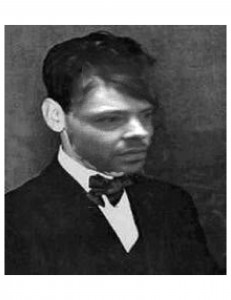 His injuries at first appeared minor but in the wake of the incident his drinking became more acute. Shortly after his fortieth birthday he was found in a stupor in the stairwell of his apartment and brought to the hospital. Here, Starkweather drifted in and out of consciousness before expiring. His last words were, “My first four books did this to me.” And by some great coincidence, just down the hall on the same floor, a forty-six year old Sampson Starkweather was admitted almost simultaneously. His chief complaint was hiccups, but it was clear that what ailed him was serious and his condition worsened over the days that followed.
His injuries at first appeared minor but in the wake of the incident his drinking became more acute. Shortly after his fortieth birthday he was found in a stupor in the stairwell of his apartment and brought to the hospital. Here, Starkweather drifted in and out of consciousness before expiring. His last words were, “My first four books did this to me.” And by some great coincidence, just down the hall on the same floor, a forty-six year old Sampson Starkweather was admitted almost simultaneously. His chief complaint was hiccups, but it was clear that what ailed him was serious and his condition worsened over the days that followed.
“Malaria?” one intrepid doctor offered, though there was no consensus. Within days, Starkweather was dead and his publishers began the long work of preparing the unfinished text of his First Four Books to be published posthumously.
Overhead, Sampson Starkweather read these books on the screen of his transom-window, writing in steam with his fingers on the glass with its fogged vantage of Mars. No myth is written all at once. And then, of course, the singularity, much delayed, in that year of sixes, when the upload was complete and the mind inside the machine became indistinguishable from the image of the body outside. (The heart in the machine is green too.)
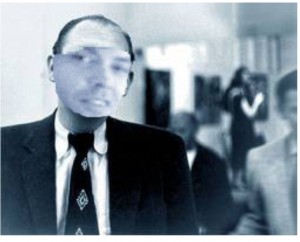 Sampson Starkweather may still be in there, if there can be called an inside, now that time has stopped and the same year continues day after day, a permanent Tron grid of ‘80s video games stretching out into infinity: “Forget futurism… I want to talk to you without skin.”
Sampson Starkweather may still be in there, if there can be called an inside, now that time has stopped and the same year continues day after day, a permanent Tron grid of ‘80s video games stretching out into infinity: “Forget futurism… I want to talk to you without skin.”
Sampson Starkweather is Sampson Starkweather’s ghost, dying. But when a ghost dies, what happens then? When a ghost dies does it come back to life?
Jared White’s most recent chapbook, THIS IS WHAT IT IS LIKE TO BE LOVED BY ME, was published by Bloof Books this spring and is now available as an ebook here, here, or here. Another chap, MY FORMER POLITICS, is forthcoming from H-NGM-N. In addition to writing, he is co-owner of Berl’s Brooklyn Poetry Shop, a small press bookstore, and father of Roman Field White, a seven-month-old baby. READ MORE >
Tao Lin: Extremely Sincere or Total Put On (??)
Tonight (I guess it’s last night by now), in the basement of The Elliott Bay Book Company here in Seattle, Tao Lin read a section of his new book, Tai Pei, to a crowd of about 70-80 people, most of whom were fans.
I’ve read very little of Tao Lin but being a part of the Indie Lit community I have heard his name quite a bit. And I do know that lots of people really like “Tao Lin” and Tao Lin’s writing. And lots of people really dislike “Tao Lin” and Tao Lin’s writing. And as we walked into the bookstore one of my new Seattle buddies underscored this with the phrase “very polarizing.” My friend was referring to Tao Lin’s writing but I guess he could just easily have been referring to “Tao Lin.”
Tao began by apologizing for being late (the reading had been pushed back from 7 to 8pm) and explained that he’d missed his 9:30 (a.m.) flight and then his new flight was delayed. Tao sounded a bit under the weather. A bit like he had a sore throat. But, the reading seemed to go ok.
The Q & A, though, is where things got interesting. And pretty quick. The 2nd question was about Tao’s use of Gchat and Gmail. This was, evidently, a touchy subject for Tao and from then on the Q & A, for the most part, was Tao bemoaning the negative reviews (and tweet) Tai Pei has received so far. READ MORE >
The Fassbinder Diaries
The Fassbinder Diaries by James Pate is now available. I had the pleasure of blurbing this (along with Johannes Göransson and Ken Baumann). The book contains many strange and beautiful pieces, including Pig Beach which you can read here. Pig Beach is one of my favorite contemporary poems In fact I like it so much I’ve mixed bits of it in to some of my readings:
The human sand pink and the pig wall burnt.
The beach light bright in the pig eye.
You can get The Fassbinder Diaries here
Curtis White will be reading in Chicago this Thursday
At City Lit in Logan Square, at 6:30pm. Curt will be reading from his new book, The Science Delusion: Asking the Big Questions in a Culture of Easy Answers, which just came out through Melville House.
I did my Master’s degree with Curt at Illinois State University, and he’s one of the smartest and best writers I know. (He’s one of the two profs who first got me reading Viktor Shklovsky.) In the 1980s, he and Ron Sukenick transformed Fiction Collective into FC2, and I learned about FC2 (and ISU) partly through the two “sampler collections” they put out (something I wish more presses did). Curt’s also written seven works of fiction, including The Idea of Home and Memories of My Father Watching TV, and now five works of nonfiction, including his infamous attack on Terry Gross (among other things), The Middle Mind. (He may not have made Gross cry, but he sure pissed off a lot of her fans.)
I’m only halfway through this new book (and will be writing more about it later), but so far I’d describe it as an attack on the idea, currently very en vogue, that scientific knowledge is the only or most superior form of knowledge, and thus the only means of accounting for what it means to be human. Right from the start Curt shows how much of science’s own knowledge is shoddy and unexamined. For example, it’s not uncommon to hear scientists like Stephen Hawking claim that the universe is beautiful, but how do they understand beauty? Not very well, Curt argues. Like in The Spirit of Disobedience, Curt demonstrates how other intellectual traditions—specifically Romanticism, which he traces through the Beats and punk—offer a way around and past some of the more inane debates consuming so many today, such as “science vs. religion.” Plus he’s funny, too.
If you’re in Chicago this Thursday, come by and hear Curt! Discussion will follow during which you can ask him embarrassing questions.

